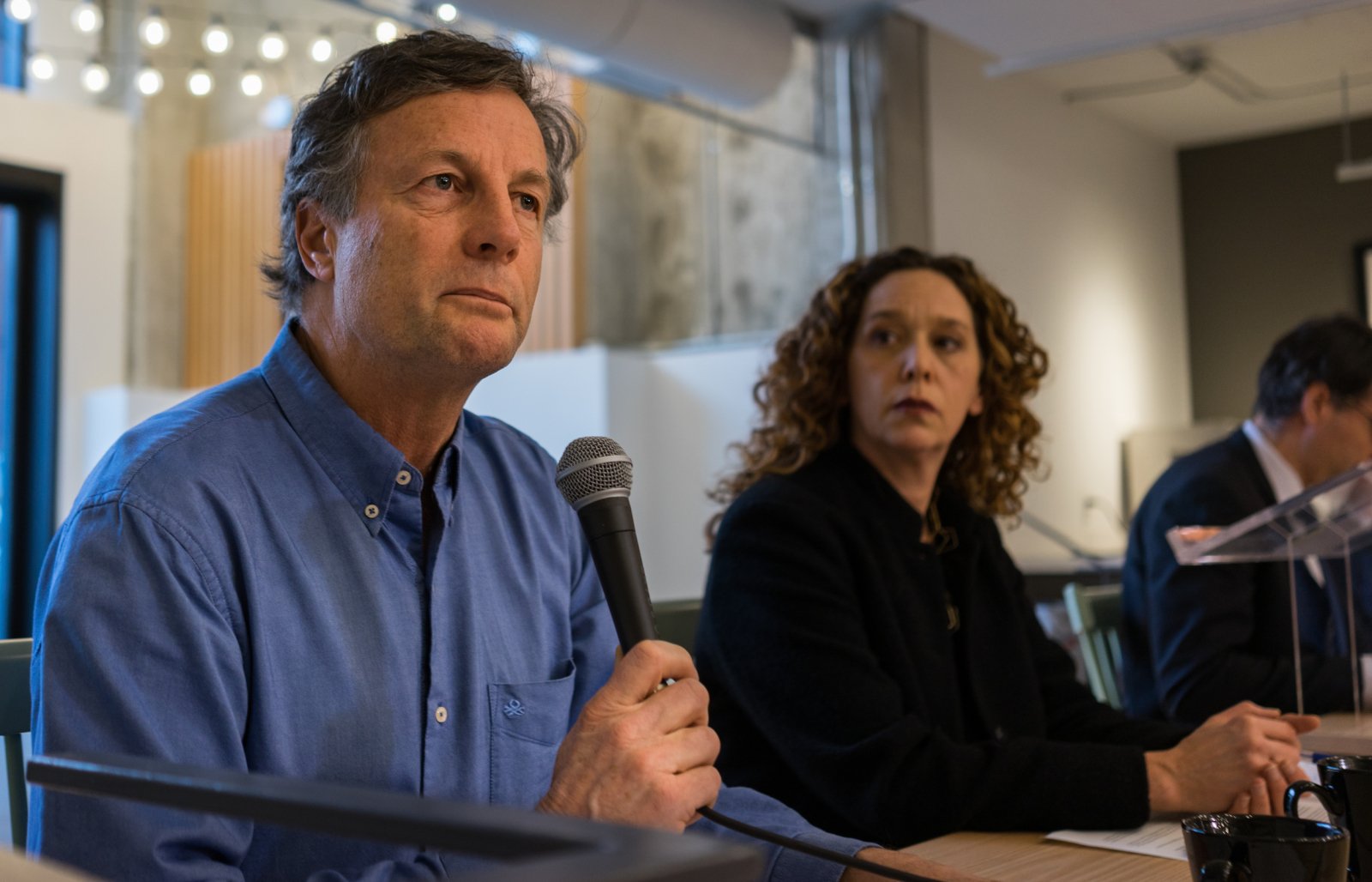Articles Menu

January 21st 2019
A pair of experts on global warming have thrown their support behind a new legal motion urging the National Energy Board to consider all climate-related impacts from the proposed Trans Mountain oil pipeline and tanker expansion in its latest review of the project.
The motion was filed on Monday by environmental group Stand.earth. The two experts have contributed to major international scientific assessment reports about climate change. Both of them warned that Canada needs to do its part by stopping the growth of emissions from the country's oilsands deposits of northern Alberta. Oilsands companies would be able to expand well beyond current production levels if the project to ship more oil gets the green light.
The oilsands, bituminous heavy oil mixed with sand beneath the boreal forest, contain the world's third largest reserves of crude oil after Saudi Arabia and Venezuela, but they are also Canada's fastest growing source of greenhouse gas emissions.
"If we build new fossil fuel infrastructure now, which will lock us into carbon emissions for decades, it will make it very difficult, if not impossible, to keep warming below 1.5 degrees," said Kirsten Zickfeld, a Simon Fraser University associate professor of climate science, at a news conference in Vancouver.
Zickfeld and economist Mark Jaccard, who was also at the news conference, have both been lead authors of reports by the Intergovernmental Panel on Climate Change. Zickfeld was a lead author of the IPCC's 2018 assessment last fall, which said the world had less than 12 years to take action to limit average global temperatures to no more than 1.5 degrees Celsius above pre-industrial levels, in order to prevent the worst impacts of climate change, including extreme weather, floods and droughts.
"If the oilsands expansion is inconsistent with two degrees Celsius, it's especially inconsistent with a target that tries to limit temperature increase to only 1.5 degrees Celsius, which the latest IPCC report (recommends,)" said Jaccard, a climate energy economics professor, who also teaches at Simon Fraser University.
The NEB is reviewing its May 2016 approval of the pipeline after the Federal Court of Appeals August 2018 decision quashed the federal government's initial approval. In its August ruling, the court said that the NEB made a "critical error" when it decided not to include tanker traffic, and particularly its effect on the endangered southern resident killer whales, as part of its initial review. The court also found that Canada had not adequately consulted with First Nations.
"It is simply irresponsible that the government has so far refused to review the full climate impacts of this project," said Tzeporah Berman, international program director at Stand.earth. "We need to ensure that emissions decline from all sectors because if we don't, it's simply not fair. Other provinces and other sectors are reducing emissions and Canadians are working hard to reduce emissions. We all see the fires, the increase in floods, the water shortages."
Stand.earth is an intervener in the review process and is arguing that the NEB must consider the environmental effects associated with the pipeline, such as the expansion of the oilsands or the use of the oil that would be shipped in the pipeline.
"The board cannot possibly fulfill its mandate of determining whether the project is in the public interest without considering whether the project is reconcilable with Canada's international obligations to substantially reduce GHG emissions," the application says. "Stand.earth respectfully submits the project is not reconcilable with these international obligations."
Canada has committed to cutting its carbon pollution 30 per cent from 2005 levels by 2030, and the Trudeau government has moved to implement a price on pollution nationwide, as a way to reach the Paris climate agreement target of no more than two degrees Celsius warming.

In September 2017, an independent NEB panel reviewing the Energy East oil pipeline proposed criteria that would require the regulator to evaluate the greenhouse gas emissions associated with the oil production and consumption that would be related to the project.
"(We are) asking them to simply apply the same standard to Trans Mountain that they applied to Energy East when it comes to the pressing issue of climate change," said Casey Leggett, legal counsel for Stand.earth in the NEB process.
Energy East was an oil pipeline proposed by Calgary-based energy company TransCanada, which would have shipped oil from Alberta to New Brunswick. The company abandoned the project, soon after the NEB introduced its new criteria. TransCanada is now focusing on proceeding with another major pipeline, Keystone XL, which would link Alberta to refineries on the Gulf coast of Texas. But TransCanada has struggled to find enough private sector shippers to commit to the project, relying in part on a long-term commitment from the Alberta government, which has pledged to ship 50,000 barrels of oil a day on the line for 20 years.
"It would be completely arbitrary and unreasonable, in fact unprincipled, not to take the same stand with respect to the Trans Mountain expansion pipeline."
The NEB had not yet received the legal documents when reached for a comment.
“When the NEB receives the motion, it will be reviewed and the board will issue further direction to the parties in the reconsideration,” James Stevenson, an NEB communications officer, said in an email to National Observer.
Stand.earth, then known as ForestEthics, filed a similar motion in 2014, asking the NEB to assess the climate impacts of the pipeline, but it was rejected.
Leggett said there has been a material change in circumstances since that time, including the Energy East pipeline cancellation, the Paris climate agreement and the fact the United Nations Secretary-General António Guterres called climate change the defining issue of our times.
"The urgency and threat is that much worse now," Leggett said. "We're confident and hopeful that at this time, the National Energy Board will do the right thing."
Berman called on the NEB to consider the public interest rather than politics.
"This process has been based for the last many years more on political posturing than it has on evidence," Berman said. "If the NEB is to have an credibility in this country moving forward, then now is the time to change that and to ensure both transparency and analysis of these critical issues and consistency with our federal government's commitments on climate change."
When asked what will happen if the NEB recommends approval of the pipeline expansion, Berman said Stand.earth works with many other organizations and Indigenous Nations who oppose the pipeline.
"There is no question there will be further legal battles ahead should the National Energy Board recommend approval of this project," she said.
The deadline for intervenors to file additional material is January 22 and the NEB's final report is slated to go to the federal government on February 22.